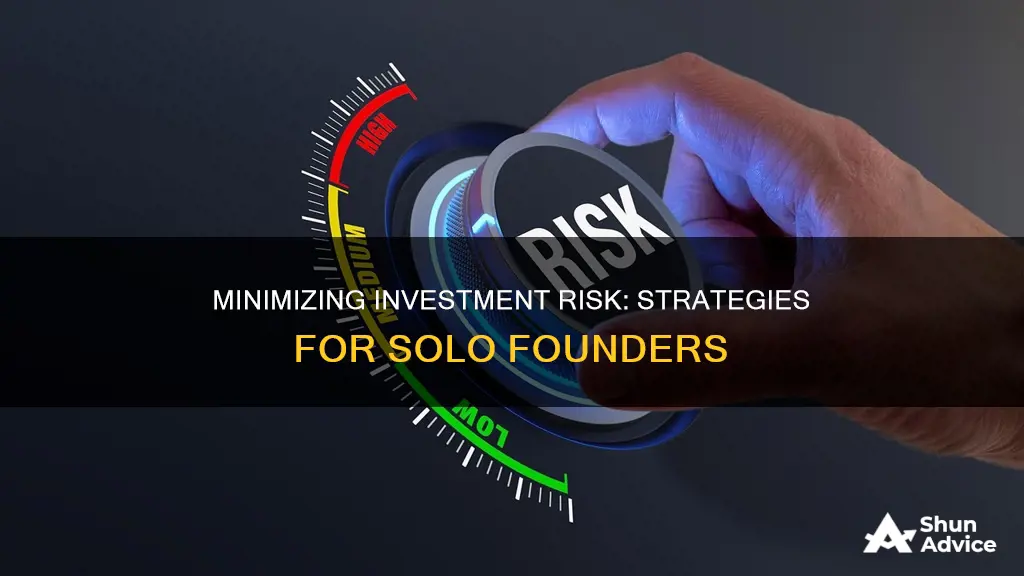
Being a solo founder comes with its own set of challenges and advantages. While it can be a lonely and vulnerable path, it also offers independence, control, and the ability to make quick decisions. Investors often perceive solo founders as a risky bet due to the lack of a complementary skill set, potential burnout, and single-point-of-failure risks. However, there are ways to reduce investment risk and attract funding as a solo founder. Building a strong team, developing a compelling pitch, showcasing traction, and addressing concerns related to scalability and team dynamics are crucial. Networking, attending pitch events, and leveraging online platforms can help identify investors who value solo founders. Understanding your risk appetite, building a support network, and making strategic hires are also important considerations. Ultimately, solo founders need to showcase their passion, resilience, and execution capabilities to secure funding for their ventures.
What You'll Learn
- Build a support network to reduce loneliness and maintain motivation
- Understand your risk appetite and be prepared to address investor concerns
- Develop a strong team to complement your skills and share your vision
- Mitigate the risk of being a single point of failure
- Showcase your passion, resilience, and ability to execute your vision

Build a support network to reduce loneliness and maintain motivation
Building a support network is crucial for solo founders to reduce loneliness and maintain motivation. Here are some strategies to help you build a strong support network:
- Set clear objectives: Determine what you want to gain from your network. Are you looking for peers at a similar stage in business or seeking mentorship? Understanding your goals will help you identify the networking opportunities that align with your objectives.
- Leverage existing relationships: Start building your support network from the relationships you already have. Reach out to family, friends, classmates, former colleagues, and previous employers. They can be a great source of support and motivation.
- Explore local opportunities: Attend local events, meetings, and groups relevant to your industry or sector. These could be chamber of commerce meetings, sector-specific meetups (e.g., for the tech industry), or groups based on the growth stage of your business (pre-start, startup, or scaleup). By actively participating in discussions, offering help, and arranging one-on-one meetings, you can add value to your network and strengthen connections.
- Reach out to admired business owners: Research businesses that have achieved similar goals to yours, and reach out to their founders or senior team members. They can offer valuable mentorship and share their experiences and lessons learned.
- Utilize online platforms: Take advantage of social media websites such as LinkedIn and Facebook, which offer community groups focused on specific industries or shared interests. Engage in these communities by asking for advice, sharing wisdom, and looking for collaboration opportunities. Additionally, explore industry-specific forums and websites that provide similar networking opportunities.
- Attend events and competitions: Look for opportunities to cast your net wider, such as national or international competitions, industry events, and trade shows. These gatherings bring together diverse individuals and can significantly expand your network.
- Recruit a business advisor: Consider finding a business advisor who can provide guidance and act as a sounding board during challenging times.
Remember, building a strong support network is a two-way street. Focus on how you can contribute to your network and help others. Be open to informal networking opportunities, as they can often lead to more organic connections. Prioritize the quality of your relationships over the quantity of connections, and take the time to get to know people and build trust.
Opening an Investment Portfolio: A Beginner's Guide to Investing
You may want to see also

Understand your risk appetite and be prepared to address investor concerns
Understanding your risk appetite and being prepared to address investor concerns is crucial when seeking investment as a solo founder. Here are some detailed insights to help you navigate this aspect effectively:
- Assess your risk tolerance: Before embarking on your entrepreneurial journey, it is essential to evaluate your comfort level with risk. Are you willing to take on the challenges and potential pitfalls of going it alone? Understand that being a solo founder comes with higher risks, but it can also lead to greater rewards if you succeed.
- Address investor concerns: Investors often perceive solo founders as riskier investments compared to teams. They may question your ability to handle the workload, manage stress, and make decisions alone. Be prepared to address these concerns by demonstrating your resilience, adaptability, and ability to execute your vision.
- Showcase your strengths: As a solo founder, you bring unique strengths to the table. Highlight your independence, creativity, and decision-making agility. Emphasize your deep industry knowledge, technical expertise, and clear vision for your startup. Show that you are committed to your venture and have the drive to make it a success.
- Build a strong support network: Surround yourself with mentors, advisors, and connections who can provide guidance and support. Tap into your existing network, attend industry events, and leverage online platforms to connect with potential investors. A strong support system will not only help you address investor concerns but also enhance your overall resilience as a solo founder.
- Understand investor preferences: Investors typically prefer investing in teams due to the reduced risk and the presence of complementary skills. However, recognize that the landscape is evolving, and some investors actively seek out solo founders who demonstrate exceptional qualities. Research potential investors, understand their preferences, and target those who align with your niche and vision.
- Mitigate risks: Investors will want to know about your risk mitigation strategies. Demonstrate how you plan to handle challenges, such as burnout, lack of complementary skills, or unforeseen circumstances. Showcase your ability to make quick decisions, adapt to market changes, and build a strong advisory network.
- Articulate your value proposition: Clearly communicate why an investor should bet on you and your startup. Highlight the unique selling points of your business, the market need you are addressing, and the traction you have gained so far. Provide metrics and evidence to support your claims and showcase the potential for strong returns.
Remember, understanding your risk appetite and effectively addressing investor concerns is crucial to securing investment as a solo founder. Be prepared to showcase your strengths, build a solid support network, and articulate a compelling value proposition that addresses the perceived risks of going it alone.
Investment Management Consultants: Guiding Your Financial Journey
You may want to see also

Develop a strong team to complement your skills and share your vision
Developing a strong team to complement your skills and share your vision is crucial for reducing investment risk as a solo founder. Here are some strategies to achieve this:
Foster Open and Honest Communication
Create an environment that encourages open and honest communication among team members. This involves sharing views, discussing obstacles, and providing and receiving feedback. Ensure that everyone feels comfortable speaking up and knows that their opinions are valued. Open communication builds trust and promotes collaboration, leading to better decision-making and innovation.
Identify Complementary Skills
When forming your team, aim for a balance of skills and complementary abilities. Look for individuals with strengths in areas such as strategy, leadership, operations, technical expertise, decision-making, problem-solving, or communication management. By combining diverse skill sets, your team will become more effective in accomplishing tasks and achieving shared goals.
Foster Collaboration and Trust
Encourage cross-functional projects and team-building activities to promote collaboration and trust within your team. This will help team members build strong relationships, learn from each other, and leverage their diverse strengths. Additionally, foster a culture of transparency and open communication to create a safe space for sharing ideas and providing constructive feedback.
Provide Adequate Resources and Training
Invest in your team's professional development by offering training, coaching, and mentorship opportunities. Help them identify areas for advancement and provide the necessary resources to enhance their skills. This demonstrates your commitment to their growth and empowers them to reach their full potential, benefiting both the individual and the organisation.
Define Roles and Responsibilities
Clearly define and communicate roles, responsibilities, and expectations for each team member. This ensures everyone understands their specific contributions and avoids confusion or duplication of efforts. Regularly review and revise roles to adapt to changing circumstances and emerging opportunities.
By implementing these strategies, you will develop a strong and cohesive team that complements your skills and shares your vision. This will not only reduce investment risk but also increase your chances of building a successful and thriving organisation.
Understanding Managed Investment Solutions: Your Money, Managed
You may want to see also

Mitigate the risk of being a single point of failure
As a solo founder, you are the single point of failure in your business. If something happens to you, the entire company is at risk. To mitigate this risk, you should consider the following strategies:
- Build a support network: Family, friends, business networking meetings, and other solo founders can help you maintain your motivation and drive. They can also be a source of ideas and inspiration.
- Understand your strengths and weaknesses: Conduct a deep self-analysis to understand your personal strengths and weaknesses, and how they might impact your startup. This will help you develop a strategy to address any potential risks associated with being a solo founder.
- Break down your workload: Instead of looking at the monumental task of starting a business as a whole, break it down into smaller, achievable weekly targets. This will help you stay focused and make progress without becoming overwhelmed.
- Find co-creators: While you may not have co-founders with equity and voting rights, you can still find individuals and organisations who can play a critical role in helping you build your business. Employees, alliances with organisations, investors, and board members can provide additional expertise and second opinions to avoid possible mistakes.
- Develop strong management skills: Solo founders need to be able to delegate effectively and focus on the few things that are vital to the success of the business. This will help ensure that you are not burdened with too many tasks and that your business runs smoothly.
- Be open to feedback: Solo founders may struggle to get honest feedback from employees or friends due to the power dynamics of the relationship. Seek out mentors or other solo founders who can provide an outside perspective and help you identify any potential risks or issues.
Valuing Investment Management Firms: Strategies for Success
You may want to see also

Showcase your passion, resilience, and ability to execute your vision
As a solo founder, you will likely face questions from investors about your ability to attract great people to your mission. To reduce investment risk, showcase your passion, resilience, and ability to execute your vision.
Passion
Your passion for your startup is a driving force that can help you persevere through challenges and embrace opportunities. Let your passion shine through by articulating the problem you aim to solve and how your startup will deliver a solution. This demonstrates your commitment and belief in your venture.
Resilience
Building resilience is crucial when facing the inevitable setbacks and obstacles of entrepreneurship. Showcase your resilience by sharing how you navigate challenges, adapt to changing market conditions, and learn from failures. Demonstrate your ability to persevere and remain dedicated to your vision, even in the face of adversity.
Ability to Execute Your Vision
Executing your vision involves making strategic decisions, adapting quickly, and driving your startup towards success. Demonstrate your ability to execute by highlighting your decision-making process, agility in pivoting, and the steps you take to turn your vision into reality. Show that you can lead and manage your business effectively.
Being a solo founder comes with unique challenges, but it also offers advantages such as independence, speed, and focused expertise. By showcasing your passion, resilience, and ability to execute your vision, you can reduce investment risk and increase your chances of success.
Retirement and Bucket Strategies: Smart Money Management?
You may want to see also
Frequently asked questions
Investors perceive solo founders as a risky bet. To reduce this risk, you can build a strong team around you by hiring people who complement your skills and share your vision. You should also focus on building a large user base from day one, as this will demonstrate to investors that there is a genuine marketplace need and interest in your product.
You can also reduce investment risk by building a support network of mentors and advisors, and by understanding your industry inside out. Additionally, creating a detailed business plan with realistic financial projections and a clear marketing strategy will help to reduce risk.
Solo founders may face challenges when raising capital due to investor preferences for teams, the lack of a co-founder, and the higher risk associated with a single founder. However, it is important to note that successful solo-founded companies do exist, and there are VCs that actively seek out solo founders.







